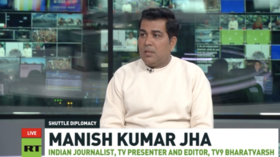Trump or Clinton, Brexit or Remain, Maduro or Guaido? They are both worse! (by Slavoj Zizek)

These days, popular media and political elites like to "big up" only wildly opposing alternatives. Thus, better alternatives rarely get an airing.
When I read about the United Kingdom's ongoing Brexit struggle, my first association is always with Stalin. Back in the late 1920s, the Georgian was asked by a journalist which deviation is worse, the rightist one (of Bukharin and company) or the leftist one (of Trotsky and associates), and he snapped back: "They are both worse!"
Indeed, it's a sad sign of our predicament that, when we are confronted with a political choice and must take a side, even if it is only the less-bad one, quite often the reply that imposes itself is: "But they are both bad!"
This, of course, does not mean that both poles of the alternative simply amount to the same. In concrete situations, we should, for example, conditionally support the protests of Yellow Vests in France or make a tactical pact with liberals to block fundamentalist threats to our freedoms (say, when fundamentalists want to limit abortion rights or pursue openly racist politics).
However, what it means is that most of the choices imposed on us by big media are false choices – their function is to obfuscate the true option. And there is a sad lesson to be drawn from this: if one side in a conflict is bad, the opposite side is not necessarily good.
Also on rt.com Everyone has fallen for the lies about Venezuela (by Lee Camp)Sad selections
Let's take today's situation in Venezuela: do we want Maduro or Guaido?
They are both worse, although not in the same sense. Maduro is "worse" because his reign brought Venezuela to a complete economic fiasco with a majority of the population living in abject poverty, a situation which cannot be attributed only to the sabotage of internal and external enemies.
It is enough to bear in mind the indelible damage that the Maduro regime did to the idea of socialism: for decades to come, we will have to listen to the variations on the theme "You want socialism? Look at Venezuela."
However, Guaido is no less "worse": when he assumed his virtual presidency, we were without doubt witnessing a well-prepared coup orchestrated by United States, not an autonomous popular insurgency (which is precisely the "better" third term missing in the alternative of Maduro and Guaido who are "both worse").
And we should not shirk from applying the same logic to the struggle between populists and establishment liberals which characterizes present Western democracies. With regard to US politics, this means that the answer to "Who is worse, Trump or Clinton (or now Pelosi)?" our answer should also be: they are both worse!
Trump is "worse," of course: an agent of "socialism for the rich," systematically undermining the norms of civilized political life, dismantling the rights of minorities and ignoring threats to our environment, among other things.
Yet, in another sense, the democratic establishment is also "worse": we should never forget that it was the immanent failure of the democratic establishment which opened up the space for Trump's populism.
Thus, the first step in defeating Trump is therefore a radical critique of the entrenched elites. Why can Trump and other populists exploit ordinary people's fears and grievances? Because they felt betrayed by those in power.
What does this amount to, concretely? Among other things, it means that, obscene as this may sound, the left should not be afraid to also learn from Trump.
Also on rt.com ‘Liar’ Trump and ‘Crazy’ Bernie Sanders already in fundraising battle for 2020Sleight of hand
How does Trump operate? Many perspicuous analysts pointed out how, while (mostly, at least) he does not violate explicit laws or rules, he exploits to the extreme the fact that all these laws and rules rely on a rich texture of unwritten rules and customs which tells us how to apply explicit laws and rules – and he brutally disregards these unwritten rules.
The latest (and, until now, the most extreme) example of this procedure is Trump's proclamation of national emergency. His critics were shocked at how he applied this measure, clearly intended only for great catastrophes like a threat of war or natural disaster, in order to build a border to protect the US territory from an invented threat.
READ MORE: 16 states sue Trump over use of emergency powers to build border wall
However, not only Democrats were critical of this measure – some rightists were also alarmed by the fact that Trump's proclamation sets a dangerous precedent: what if a future leftist-Democratic president will proclaim a national emergency due to, say, global warming?
My point is that a leftist president should do precisely something like this, especially given global warming effectively IS not only a national emergency. Proclaimed or not, we ARE in an emergency state.
And this brings us back to the ongoing deadlock with Brexit. The debilitating blockade of clear political decisions in the UK, and the split that cuts across both traditionally dominant parties clearly demonstrates that both sides are worse. Neither of them seems to have a coherent political vision, instead they both mix opportunism with ideological distortions.
Brexiteers are "worse" because of the populist-nationalist core of their reasoning, anti-Brexiteers are "worse" because they do not really address what is deeply wrong with the way the EU functions now.
The choice Brits are offered thus ultimately just reproduces the global conflict between the liberal establishment and populist reactions to it.
Both sides fail to address the true task: how to construct a new Europe that would redeem what is worth fighting for in the European emancipatory legacy. Instead they betray this legacy, one by pushing Europe back towards nation-state politics, the other by transforming Europe into a domain of technocratic experts. These are the two sides of the same catastrophe.
Like this story? Share it with a friend!
Subscribe to RT newsletter to get stories the mainstream media won’t tell you.
The statements, views and opinions expressed in this column are solely those of the author and do not necessarily represent those of RT.














